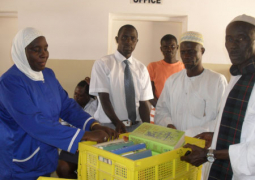The declaration was announced by the Minister of Health and Social Welfare, who represented the Gambian leader at the launching ceremony on “Ending Open Defecation” in The Gambia, held at the Dalagas Community in the Central River Region (CRR).
The programme was also supported by UNICEF.
The ministers of Health and the Environment, UNICEF country representative, the Dalagas community satellite villages accompanied by the UNICEF Goodwill Ambassador Jaliba Kuyateh and other cultural groups, as well as the media fraternity from across the country, witnessed the launching.
Delivering the statement of the President, the Minister of Health and Social Welfare, Omar Sey, said the Gambia government’s declaration on ‘ending open defecation in The Gambia’ is a call to action.
The Ministry of Health and Social Welfare together with key partners and stakeholders have worked very hard to establish a strategic development framework that is consistent with Vision 2020, as well as the national sanitation policy, which is universal access to basic sanitation for all.
Universal access means everyone and everywhere has access to safe hygienic toilet at home, schools, health facilities and public places, which is the only way open defecation can be eliminated in The Gambia, he said.
“Every man, woman, and child deserves the facility of a safe hygienic toilet,” he said, adding that the Gambia government would be committed to prioritising sanitation, as well as fast-tracking the progress of sanitation to eliminate open defecation and bring better health and dignity to the people.
He added: “The Gambia government recognizes that poor sanitation undermines a country’s social and economic development and has serious health impacts on the population.”
According to the health minister, currently the country had registered significant results in reducing open defecation nationally, which stands at 2 per cent.
He said with this, the country is rated as the first in Africa to end open defecation.
“In order for the impact to be achieved and gains registered to be sustained, on behalf of the President, I hereby declare that this country be ‘open defecated-free’ by end 2016,” he said.
In her remarks, the UNICEF country representative, Sara Beysolow Nyanti, said The Gambia joined other African nations at the African Sanitation Conference where African ministers responsible for sanitation and hygiene signed the Ngor Declaration.
The use of Ngor, which means “dignity in Wolof”, demonstrates the fact that African Ministers wanted to highlight the negative impact open defecation on the dignity of others.
As they look towards the draft Sustainable Development Goals, they see that nations are agreeing that by 2030, they must achieve access to adequate and equitable sanitation and hygiene for all, she said.
Not only has the Gambia spoken loudly to end open defecation, the country had set the bar very high by targeting 2017, 13 years earlier than the rest of the continent, she went on.
In the last few years, The Gambia had made progress in reducing open defecation in the rural area to 4 per cent and 2 per cent nationally, she continued.
UNICEF would continue to focus on sanitation improvements and support the Gambia government to end open defecation, she added.
Pa Ousman Jarju, Minister of Environment, in his remarks on the occasion, said they have also integrated sanitation in the water sector, and have in place the current rural water supply sanitation project being implemented by the department of Water Resources in partnership with the department of Health. They are also, through community development, currently constructing 1,000 latrines throughout the country.
He said they have constructed 50 latrines in key institutions like lumors, markets and other places because they do not want to encourage open defecation.
He added that his ministry through the department of Water Resources would endeavour to ensure the second phase of the ADB rural water supply project would double the number of sanitation facilities that would be provided for the community so they could achieve the target in 2017.
CRR Governor Omar Khan, in his speech, said lack of toilets remains one of the leading causes of illness and death among children.
He said it was estimated that around 2 million children die each year from pneumonia and diarrhea illnesses, which are largely preventable with improvement in water, sanitation and hygiene.
Lack of adequate sanitation and hygiene facilities and clean water prohibits a nation from attaining other development goals, such as maternal and child health, education, gender equality and ending extreme poverty and hunger, he said.
Read Other Articles In Article (Archive)
Jammeh donates D500,000 to cabinet credit union
Jan 22, 2013, 10:55 AM



